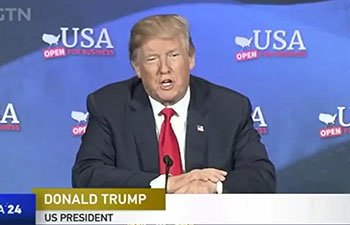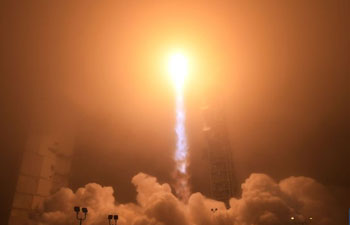by Xinhua writers Liu Chen, Hu Yousong
WASHINGTON, May 7 (Xinhua) -- The 2015 Iran nuclear deal was effective and a U.S. withdrawal from it may bear significant impact, both politically and diplomatically, a U.S. sanctions expert has said.
U.S. President Donald Trump, who has long been criticizing the deal, was expected to announce his decision on Tuesday afternoon about whether to pull the United States out of the landmark pact inked to curb Iran's nuclear development.
The deal may not be perfect, but the best way to fix it "is to implement it and then to work on its problems in a positive atmosphere," Richard Nephew, a senior research scholar at the Columbia University, told Xinhua in an exclusive interview recently.
Nephew served as the lead sanctions expert for the U.S. team negotiating the Iran nuclear deal from 2013-2014.
AN EFFECTIVE DEAL
The Iran nuclear deal was negotiated between the six world powers, namely China, Russia, Britain, France, the United States and Germany, and Iran in 2015, in which the West promised to relieve sanctions on Tehran in exchange for a halt in Iran's efforts to develop a nuclear weapon.
Nephew said the pact was effective as it kept Tehran further away from being able to produce nuclear weapons.
"For a while we were looking at two to three months to nuclear weapons for Iran, now it's at least a year," the sanctions expert noted, adding that the deal has also given the international community "lots of transparency, lots of monitoring" to see if Iran changes its course.
The International Atomic Energy Agency (IAEA), a UN watchdog tasked monitoring Iran's nuclear activities, had in the past certified eight times Iran's compliance with the nuclear deal.
However, Trump has been criticizing the deal since its presidential campaign. In October, he decertified the deal, blaming Iran for committing "multiple violations of the agreement" and "not living up to the spirit of the deal."
"Iran is absolutely obeying the requirements of the JCPOA," said Nephew, citing the acronym of official name of the deal, which was the Joint Comprehensive Plan of Action.
Nephew once served as Principal Deputy Coordinator for Sanctions Policy at the Department of State from 2013-2015.
The former diplomat regarded Trump administration' s "spirit arguments" as weak and unpersuasive. "If you don't have actual proof of bad behavior, you talk about spirit," he said.
IT'S ABOUT IRANIAN GOVERNMENT
Meanwhile, Trump also wanted to eliminate the "sunset clauses" that allow Iran to restart its uranium enrichment program after 2025, and include clauses to curb Iran's missile programs and its expansion in the Middle East into the pact
"A lot of Americans, even myself would agree it would be better if we have gotten something a little bit more robust," said Nephew.
But the difficulty Trump will find is that,if he gets away from this agreement, it's very hard to "get plan B to work," he noted.
"There's only so far as they (Iran) may be prepared to go, in addressing U.S. concerns," Nephew added.
Nephew, who was a director for Iran at the National Security Council from 2011-2013, observed that the real problem that Trump and his hawkish advisors had about Iran went beyond the multi-national deal itself.
"It's about the Iranian government," said Nephew, pointing out Washington's "long and unpleasant history" with Tehran in the past decades, including the Iran hostage crisis in the late 1970s and the growth of terrorism in the region.
For the supporters of the deal and the international community, it was more like "an excuse," said Nephew, referring to Washington's objection about the deal. "This is just the Trump administration being opposed to Iran."
"FIX" A FALSE ARGUMENT
In late April, French and German leaders visited the White House, as their trips were largely interpreted as a "tag-team" effort to save the deal with little fruit seemingly yielded so far.
In a joint press conference with Trump, French President Emmanuel Macron proposed to sign a "new deal" with Iran, including making sure no Iranian nuclear activity in the long run, putting an end to Tehran's ballistic activities and generating the conditions for a political solution to "contain" Iran in the region.
To a large extent, Macron's suggestions echoed Trump's demands to "fix" the current deal.
However, Nephew saw the fix arguments "slightly disingenuous." "All the people talking about fixing the agreement are the people saying we should kill the agreement and they are also people who understand very well that Iran is not going to agree to fixes," he noted.
The expert said the "fix" that Trump has talked about was not a reciprocal one as Washington "give(s) something and get(s) something," but rather the one that "the U.S. gets a lot better at the agreement out of the Iranians and the Iranians say thank you."
In fact, Iran has been darting tough rhetoric facing a possible U.S. walk-away from the deal.
Iran's Foreign Minister Mohammad Javad Zarif on Thursday ruled out renegotiating a new deal or holding talks over its missile program.
Iran has also threatened to resume nuclear enrichment activities in case Trump resumed U.S. sanctions on Iran.
POSSIBLE FALLOUT
For Nephew, a U.S. withdrawal, which he saw as highly likely, may bear little direct economic influence on America, but there will certainly be direct political and diplomatic impact.
The expert said that with Iran possibly to restart its nuclear program, security concerns will be raised in the Middle East with countries mulling their own nuclear development. It will also affect U.S. ties with its allies, especially the European countries. Washington's image as a trustworthy country will also be tarnished.
"It might even help encourage a trade war, if we're using sanctions in ways that other countries don't support," said Nephew.
"It will certainly be a period of high risk and high tension for the United States," said Nephew.
"I don't think they (the Trump administration) are organized to be able to handle it," he added.













